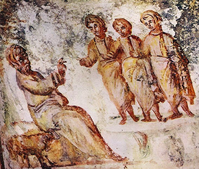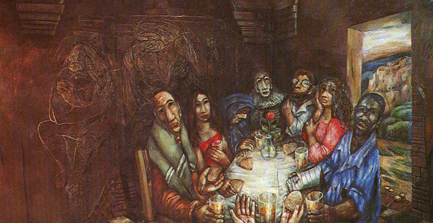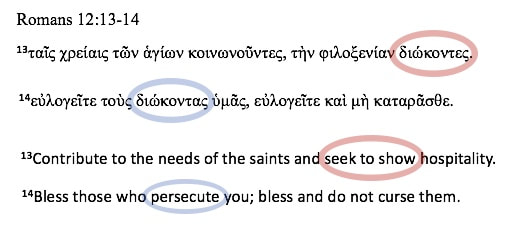 This morning on the Sidewalk and at Sunday service tomorrow, I begin a series through the prophet Jeremiah’s book. What got the ball rolling in my thought process—on why did I pick Jeremiah as the next series—was a question I had been asking since my alma mater’s (Crown College’s, aka St. Paul Bible College’s) 100th anniversary’s gathering a few years ago. At one of the weekend’s events, they gathered together the previous Crown presidents for a Q&A. The final question was, “What is one thing that isn’t being taught at Crown College that needs to be taught at Crown College?” The last answer came from the oldest and most senior of the former Crown College presidents (he was back in the 70s; I was there ’81-’84), Dr. Grubbs, a kindly and wise Christian & Missionary Alliance elder statesman; he said: “How the students will endure persecution.” This stuck with me. For years, now, his answer has been festering in my heart and thoughts during my time here as a pastor in the Hill: Am I teaching my flock how to endure persecution? Do I even know how to teach them how to endure persecution? So, I have been asking myself, “How do I teach my CPC in The Hill flock to endure persecution?” As I was finishing up my sermon series through Galatians, I had been praying, “What’s next?” The Book of Jeremiah seemed to be what was being presented—almost everywhere I turned (books and material I was reading; podcasts I was listening to; casual conversations) pointed to Jeremiah. So, I am preaching through Jeremiah—both to listen for myself and to help my people reflect on that question: “How does a Christian, a church, endure persecution?” And then, hopefully, answer the question for myself, “How, as a pastor, do I train/teach my CPC in The Hill flock to endure persecution? How?” I think Jeremiah will help answer all these related questions. *We will get to what “persecution” is in the coarse of the series.
0 Comments
 Working on Roman’s 12 for Sunday. There is a little creative punning by Paul in his Romans 12 (ESV). Most think of a pun as some form of joke or humorous quip; however a pun is a word-play, also called paronomasia. A pun can be both visual (the form of the word) and auditory (hearing), a form of word-play that suggests two or more meanings played off each other for rhetorical effect, harnessing the multiple meanings, for an intended humorous or rhetorical effect. Here in Romans 12, Paul uses such punning to emphasize the importance and significance of the gathered-church. “Contribute to the needs of the saints and seek to show hospitality” (v. 13). Here is my own translation, which reflects Paul's original word order and the reading of it out loud. Sometimes hearing it is the best way to catch the intent: “The needs of the saints, contribute; hospitality, intentionally pursue. Bless those who persecute, bless and do not curse” (Rom 12:13-14). Three things worth noting:
 Imagine, a beggar now preaching the gospel and discipling a small group of believers meeting in a doctor’s home. There is plenty of room in the Father’s house. Imagine, a former male temple prostitute now the appointed host of a gathered-church in a small, shanty shelter of a home. There is plenty of room in the Father’s house. Imagine a young women who used to offer herself at that very table to the men who use to recline for their symposia dinners now offering prayers and thanksgiving saying, “Who the Son sets free, oh is free indeed, I’m a child of God, in my Father’s house, there’s a place for me.” Imagine a household slave reclining at a table he would never have been allowed to eat from lifting up a loaf of bread, breaking it and saying, “Jesus instructed is, ‘This is my body, broken for you,’ He has made us one body in Christ.” Imagine, a merchant male head of a household, who has thrown out two deformed born infants and an unwanted girl infant now sitting next to his daughter and son and his slave’s children all at the table, an elder teaching a rag tag of forgotten in his home, saying, “Jesus instructed us, ‘This is the cup of the new covenant, My blood shed for you for the forgiveness of sins.’” In my Father’s house there is a place for me, a child of God, yes I am. In 1 Peter 5, the apostle of Jesus turns his attention to church leaders–no doubt to the male head of households who now occupy the leadership roles and shepherding of the house churches in Pontus, Galatia, Cappadocia, Asia, and Bithynia (1:1). The apostle had been speaking of the church under persecution, suffering, and the object of outsider insults (2:11-4:19). The stress has been on the church’s (i.e., the individual believers) conduct outside of the gathered-church (2:12). Peter addressed slaves who had found themselves a part of a gathered-church, fully welcome to recline at the table, who had to return to unbelieving masters, subject to all the horrors of enslavement in an empire-space where they would not even be considered equal to a beast of burden. He spoke to believing wives, equal at the table of the gathered-church, who had to return to unbelieving husbands and subject to all the social-cultural space of women in the Greco-Roman world (3:1–6). Of course, Peter put the hammer down on husbands to be different than the social and cultural definition and expectations for husbands, now honoring their wives (3:7).
Imagine Greco-Roman male head of households who were the very heart of enforcing the social and cultural imagination of the Caesar-cult and the empire, now charged to act like Christ, to honor their wives, treat their slaves as human-beings, equal in all ways, and to treasure all born to them, the deformed, the girls, the boys. Imagine that these men, once the center of the Roman universe were so deconstructed by the good news of the forgiveness of sins and then reconstructed (by and through faith) to die for their family, to suffer for Christ, to make disciples–that is the good news for the community, the challenge to the empire, the stand against Caesar. The household gathered-church, God's way of changing the world. Imagine.
|
AuthorChip M. Anderson, advocate for biblical social action; pastor of an urban church plant in the Hill neighborhood of New Haven, CT; husband, father, author, former Greek & NT professor; and, 19 years involved with social action. Archives
February 2024
Categories
All
|
Pages |
More Pages |
|

 RSS Feed
RSS Feed